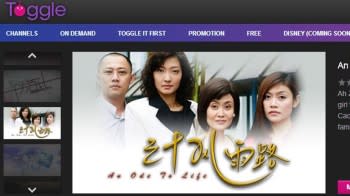MediaCorp opens up on failures and future direction in the digital and startup space
We’re seeing MediaCorp getting pretty active in the technology and startup scene of late, venturing into mobile apps, e-commerce, startup incubation, and venture capital investments. In an on-stage interview at the Startup Asia Jakarta 2013 conference, MediaCorp’s strategic planning head Guillaume Sachet (pictured right) talked about the shift in consumption patterns away from print, which caused the media giant to look more closely at the digital and startup space. We grabbed Sachet on the sidelines to find out more about MediaCorp’s involvement and updates on its current projects.
Vanessa: MediaCorp launched a food recommendation app a couple of months back. What was the decision behind making this new app?
Sachet: The decision was quite natural. Our entertainment magazine 8 Days itself had a lot of food reviews, and is very well-followed by Singaporeans. There are also a lot of TV shows around the topic of food, and the creation of the app was a natural extension into the digital space. This also applies to StyleXStyle, which is part of our digital initiatives, where our core is to capture new customers. Right now, 8 Days Eat app only focuses on food.
What are the demographics like, and how is it different from other apps within the same space, such as HungryGoWhere, OpenRice, and Burpple?
Our users are aged between 16 to 49 years old. We think it’s different from the apps you’ve mentioned, and possibly better. We have a professional editorial team coming together to curate food reviews, as compared to user generated content. We also have MediaCorp staff to endorse our content, such as featuring the favourite restaurants of celebrity DJs Justin Ang and Vernon A. (also known as Muttons). These are strong differentiators in itself.
What was the decision behind using the pink hue (Editor: which resembles Burpple)?
The color pink was a decision made with the creative director, which has a refreshing feeling that is trendy and hip. We are also looking at how else we can improve the app, where you can like, comment, and bridge professional and user generated content. That is important because it helps to bring volume. There are also considerations such as other features and video content you need to have to enrich the application.
Any expansion plans for 8 Days Eat?
We are looking to expand in the region, but the strategy has not been finalized yet. The natural expansion would be Malaysia, Thailand, and Indonesia, but first we would need to build a strong home base before talking about expansion.
Why did ilovebooks.com close down?

When it launched, it was under tough market conditions and was not commercially viable, and hence the decision to exit. We had about 700,000 titles in 40 categories, which was not enough traction to make it viable. The e-books industry was a business to get better deals. You need to get directly to the source. Once you go through distributors, it is not any cheaper and we didn’t have a wider collection.
What were the lessons learned?
In the digital space, you need to be able to monitor your business. It is important to know when to let go. In the case of ilovebooks.com, it was because of the numbers. We also take into consideration how close the venture is to our core business. If you talk about 8 Days and 8 Days Eat, there is a direct connection between MediaCorp and the app. However, Singaporeans didn’t associate the MediaCorp branding to print (or publications), which in this case, was ilovebooks.com. In the future, we will take into consideration how closely aligned our new venture is with our core business.
How is StyleXStyle coming along?
We define StyeXStyle as a one-stop portal for fashionistas in Singapore, and our model is positioned differently from beauty boxes such as VanityTrove. We are providing a 360 solution for advertisers. Whether we enter the e-commerce market or make it bigger depends on the traction. Afterall, e-commerce is a different animal altogether.
For instance, we launched a TV program series “Kaiwaii Style” where we feature everything that is new and latest in Japan, where the audience can log into the site to make purchase on the items that has been picked out by the celebrity.
Why the decision of entering the e-commerce space?
The advertising dollar is now being challenged. We need to think of other ways to make money, be it in terms of transactions, subscriptions, and going beyond advertising dollar. We are constantly seeking out for new business models.
For us, we have the content on MediaCorp’s distribution channels. For instance, our editorial team now looks at fashion, and how we monetize is through advertising and e-commerce.
Why did you guys not choose to base out of popular startup co-working spaces such as Plugin@Blk71 for The Mediapreneur program?
We had an interesting discussion with the team. One said we should sit in the startup ecosystem, and have ourselves based out of Plugin@Blk71 or The Hub. If we have chosen the Plugin@Blk71, we will just be one of the many incubators based there. If we want to differentiate ourselves and not be just another incubator, we needed an environment where entrepreneurs can test and grow businesses. We want our startups to interact with people and get access to our resources.
In essence, the startup will be able to see whether its technology is up to standards based on the demand. We can point out areas where they can improve, and be the ones driving the product roadmap and influence the company development. We can give feedback as customers on areas they need to change or improve.
How is The Mediapreneur program coming along?

We have yet to launch the incubator, and is currently undergoing paperwork. We are aiming to get two to three companies on board every six months, with a possible renewal. We’re not too sure if it will work, and we don’t want to say we will be accepting 20 companies in our incubator. We’re looking to start small.
How heavily involved will MediaCorp be in “The Mediapreneur”?
We will be involved in the heavy lifting work, such as attending important sales meetings. We are not looking at majority equity and could range from 10 to 20 percent, but less than 50 percent with an investment less than S$30,000 ($24,000). We will be offering our expertise, such as go-to-market and customer experience perspectives, into the mix for these startups.
We also have a fund where we will be investing at most S$200,000 ($160,000) in each startup, and this is not limited to Singapore startups. We already have an investment under this fund, which is Singapore-based video streaming tool startup Ooyala. It wants to develop in the region and will be setting up an advisory channel, in which MediaCorp is part of.
What space is MediaCorp looking at for investment?
We’re looking at digital media in the broad sense. It can range from lifestyle, food, to fashion. It could also be around video streaming technology, augmented reality, and analytics.
Why analytics?
Well in the past when it comes to us pushing content, they view it whether they like it or not – they don’t have much of a choice. It is now a two-way communication. Telcos have a lot of data and know everything about you. Through that, you build on that insight, on the kind of content you want to watch and try to match.
What else are you guys looking at?

We are also looking at second screen technology, and how we can capture this. People watch TV programmes and use tablet at the same time. This is an interesting shift. Now the question is, how do we capture content and monetize the second screen? For instance, if you are looking the Star Awards show, you would be able to find out information on the star. If you fancy that dress you see on screen, is it possible to purchase it using your tablet?
We’re hoping to be disrupting instead of being disrupted. For the case of Toggle, we want to push original content and MediaCorp content series on Toggle before they are on air. And only on Toggle, you get to see alternative endings to certain shows. Using that interactivity is one big effort on how we can provide a 360 solution for our advertisers. We are looking at leveraging on the power of digital content, not the static content that you push.
(Editing by Terence Lee, images from Lifestyle Asia, xinmsn)
The post MediaCorp opens up on failures and future direction in the digital and startup space appeared first on Tech in Asia.

 Yahoo Finance
Yahoo Finance 
